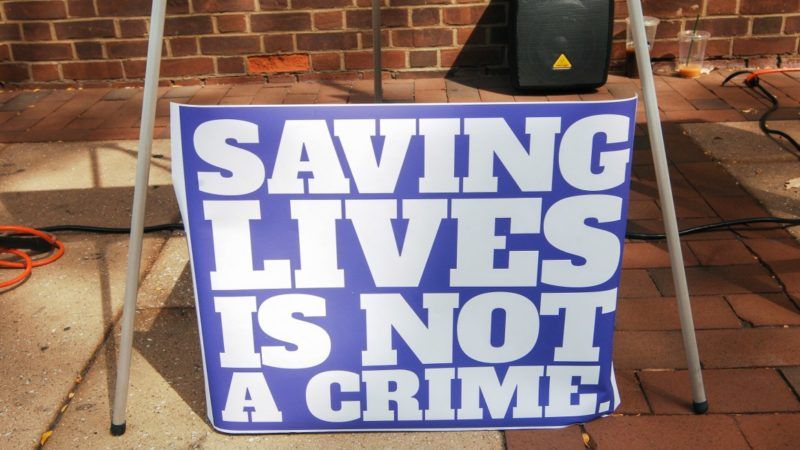Philadelphia Poised To Open America's First Public Safe Injection Site in Just a Week
Federal judge confirms ruling that it doesn’t violate federal “crack house” law.

An indoor space where users of illicit drugs may inject under medical supervision and without fear of arrest may be opening in just a week in South Philadelphia, making it the first of its kind to operate openly in the United States.
On Tuesday, a federal judge confirmed and finalized a ruling from October after Philadelphia and the nonprofit group Safehouse in January requested explicit permission from the judge to open a safe injection facility (SIF).
Safehouse says its SIF model provides a range of social service options in addition to medically supervised drug use:
Participants will be presented with rehabilitation options at multiple points during a visit to Safehouse, beginning with when they arrive and go through a registration process. A physical and behavioral health assessment will be conducted, and a range of overdose prevention services offered.
From the consumption area, participants will be directed to the medically supervised observation room and offered on-site initiation of Medication Assisted Treatment (MAT), wound care, and referrals to primary care, social services, and housing opportunities. Upon arrival, participants may choose to go directly to the observation room to access MAT and other services.
Today, Safehouse formally announced that it will open the first of these facilities in South Philadelphia, perhaps as early as next week. The South Philadelphia intersection where Safehouse will first open is about six miles from the Kensington neighborhood, which is where the city sees the most public use of opioids, and where the city and Safehouse hoped to open the first SIF. The Philadelphia Inquirer reports that Safehouse will be announcing a second SIF location in the near future, so it's still possible that Kensington or a nearby North Philadelphia neighborhood will still get a location.
While Safehouse is moving forward, the fight is not over. U.S. Attorney William McSwain of the Eastern District of Pennsylvania asked a federal judge to rule that a SIF would violate the "crack house" provision of the federal Controlled Substance Act, which makes it a federal crime to operate a facility for the purpose of "manufacturing, distributing, or using any controlled substance."
Instead, U.S. District Judge Gerald Austin McHugh of the Eastern District of Pennsylvania read through the law and determined that a SIF doesn't qualify as a drug den under the text and precedents of the law's application. On Tuesday, he affirmed this ruling, so Philadelphia and Safehouse are moving forward.
McSwain is appealing and is warning the city not to open a facility. But it's not entirely clear what he's going to do. Via the Inquirer:
"We believe that Safehouse's proposed activity threatens to institutionalize the scourge of illegal drug use—and all the problems that come with it—in Philadelphia neighborhoods. In light of these concerns, Safehouse should act prudently and not rush to open while the appeal is pending. But if it does rush forward, my office will evaluate all options available under the law."
McSwain has threatened everything from arrests to drug seizures to asset forfeiture in order to stop Safehouse. He insists—and this is the official position of the Department of Justice—that SIFs are illegal, encourage drug use, and shouldn't be permitted by cities or states. Proponents see SIFs as an important harm reduction tool to respond to America's opioid overdose crisis, fed in part by people buying black market drugs of unknown history, some laced with incredibly potent illicit fentanyl.
McSwain's essentially arguing here that the prospect of dying serves as a disincentive to use illegal drugs. But as Reason's Jacob Sullum has noted, attempts by the government to overly restrict legal access to opioids and painkillers actually exacerbated the consumption of illicit drugs and contributed to the overdose crisis. It's the spread of harm-reduction methods (like the availability of naloxone, which reverses overdoses) that have led to a recent decline in overdose deaths.
SIFs are another form of harm reduction. And studies in countries that have allowed SIFs have shown that they do assist in reducing deaths and the spread of disease, and cost-benefit analyses show that they save money in the long-run when compared to the public health expenses of sending emergency responders out to overdose calls.
But some neighbors only see a SIF as a lure for drug users. This morning some South Philadelphia residents who were not expecting the facility to be in their neighborhood protested the deal. One nearby business owner told the Inquirer, "You know the old saying, 'not in my backyard?' That's exactly how I feel."
But the public drug use, addiction, and overdose crisis is already in his backyard. A SIF will make it less deadly.


Show Comments (58)